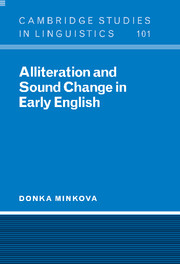Book contents
- Frontmatter
- Contents
- List of figures
- List of tables
- List of abbreviations
- Preface
- 1 Social and linguistic setting of alliterative verse in Anglo-Saxon and Medieval England
- 2 Linguistic structures in English alliterative verse
- 3 Segmental histories: velar palatalization
- 4 Syllable structure
- 5 ONSET and cluster alliteration in Old English: the case of sp-, st-, sk-
- 6 ONSET and cluster alliteration in Middle English
- 7 Verse evidence for cluster simplification in Middle English
- References
- Index of names
- Subject index
1 - Social and linguistic setting of alliterative verse in Anglo-Saxon and Medieval England
Published online by Cambridge University Press: 22 September 2009
- Frontmatter
- Contents
- List of figures
- List of tables
- List of abbreviations
- Preface
- 1 Social and linguistic setting of alliterative verse in Anglo-Saxon and Medieval England
- 2 Linguistic structures in English alliterative verse
- 3 Segmental histories: velar palatalization
- 4 Syllable structure
- 5 ONSET and cluster alliteration in Old English: the case of sp-, st-, sk-
- 6 ONSET and cluster alliteration in Middle English
- 7 Verse evidence for cluster simplification in Middle English
- References
- Index of names
- Subject index
Summary
The primary goal of this study is to establish and analyze the linguistic properties of early English verse. Verse is not created in a vacuum; a consideration of some non-structural factors that could influence the composition of poetry is important for our understanding of its linguistic dimensions. This chapter presents a brief overview of the social and cultural conditions under which alliterative verse was produced and enjoyed in Anglo-Saxon and Medieval England.
The Anglo-Saxon poetic scene
Verse composition was a foremost outlet of creativity and a cherished form of entertainment, moral edification, and historical record keeping for the Anglo-Saxons. When the Northumbrian priest and chronicler Bede (b. 672/673–d. 735) wrote his Ecclesiastical History of the English People in Latin, the poetic rendition of important themes and events in the vernacular must have already been a highly prestigious undertaking. Bede tells us how Cadmon, an illiterate shepherd, found his inability to sing in company shameful. In a dream a stranger appeared urging him to sing the song of the Creation and he uttered “verses which he had never heard.” He was then taken to the monastery at Whitby where his divine poetic gift was tested and confirmed. He spent the rest of his life as a layman in the monastery, enjoying the fellowship of the abbess and the learned brethren, and composing more religious poetry.
- Type
- Chapter
- Information
- Alliteration and Sound Change in Early English , pp. 1 - 21Publisher: Cambridge University PressPrint publication year: 2003

